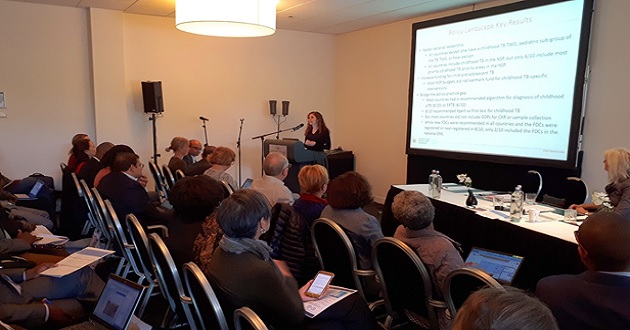
WHO convened a consultation on 22 October to facilitate the implementation of Unitaid projects targeted at preventing the spread of tuberculosis (TB), in populations most at risk of contracting the disease and to increase TB diagnosis in children. The participants of the meeting included Unitaid, grantees of the three Unitaid supported projects and country stakeholders, including national TB programme (NTP) representatives, technical partners and WHO country staff.
The objectives of the WHO stakeholder consultation were three-fold:
- Share experiences of early country engagement and implementation of Unitaid supported projects promoting innovations for management of latent TB infection and childhood TB.
- Share programme perspectives and plans for nationwide scale up of innovative tools and models for LTBI and childhood TB.
- Identify bottlenecks, policy gaps, technical assistance needs and key next steps in rollout and implementation of projects in countries.
For each of the three projects, landscape analyses were presented and discussed with NTPs and partners. Project-specific issues were identified and an outline of the next steps and their nationwide scale-up of the projects were agreed upon.
The IMPAACT4TB project of the Aurum Institute focusses on the prevention of the spread of tuberculosis (TB) by ensuring that those with latent TB infection (LTBI) - who are infected with the TB bacteria but do not have symptoms and are not infectious – have access to preventive treatment therapy. IMPAACT4TB project promotes the use of a shorter 3 months weekly (12 doses) preventive treatment regimen (3HP) instead of the current 6 months daily treatment (6H). This project also aims to encourage generic manufacturers to start producing 3HP so the treatment cost becomes affordable in high TB burden countries. This project covers 12 countries in Africa, Latin America and Asia with high burdens of TB or TB/HIV.
The TB-SPEED project of the University of Bordeaux – aims at increasing TB diagnosis in children. TB-SPEED seeks to deliver an easier way of detecting TB in children through rapid battery-operated molecular tests in local health centers, optimized chest radiography, and simpler specimen collection. The project also aims to optimize TB diagnosis in children living with HIV, in children with severe pneumonia and in children with severe malnutrition. The TB-SPEED project is implemented in seven countries: Cambodia, Cameroon, Cote d’Ivoire, Mozambique, Sierra Leone, Uganda and Zambia.
The CaP TB project of the Elisabeth Glaser Paediatric Aids Foundation aims to integrate TB prevention, diagnosis and treatment into existing HIV and maternal and child health services. The project runs from October 2017 to September 2021 in nine sub-Saharan African countries (Cameroon, Côte d’Ivoire, Democratic Republic of the Congo, Kenya, Lesotho, Malawi, United Republic of Tanzania, Uganda, and Zimbabwe) and India.
WHO headquarters, regional and country offices will continue to work closely with the Ministries of Health and the Unitaid grantees to enable smooth implementation of projects in countries, support updating of national TB and HIV guidelines and the nationwide scale-up of the innovative models and treatment regimen promoted by Unitaid.
